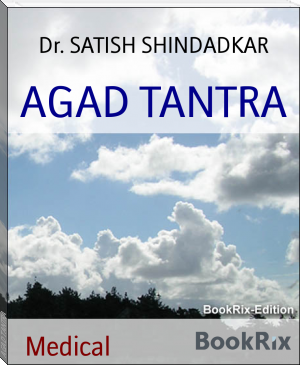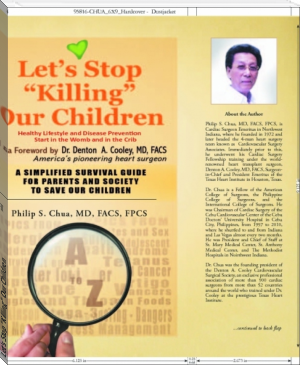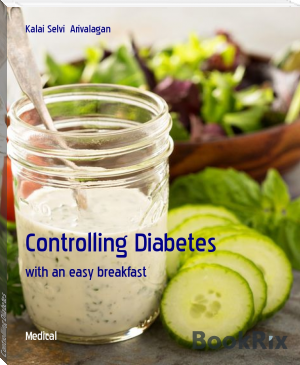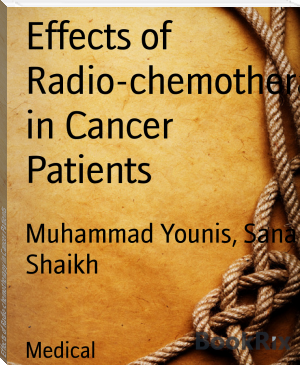AGAD TANTRA, Dr. SATISH SHINDADKAR [web based ebook reader .txt] 📗

- Author: Dr. SATISH SHINDADKAR
Book online «AGAD TANTRA, Dr. SATISH SHINDADKAR [web based ebook reader .txt] 📗». Author Dr. SATISH SHINDADKAR
कोणत्याही प्रकारचे प्रतिविष 3 दिवसापर्यंत गोमूत्रात भिजवून नंतर उन्हात वाळवल्यास शुद्ध होते आणि ते बृंहण पुष्टीकारक गुणयुक्त होते. असे शुद्ध प्रतिविष वातज रोगांत मस्तुजल अनुपाने, पित्तज विकारात दुग्ध अनुपाने तर कफज विकारात गोमूत्र अनुपाने आणि त्रिदोषज विकारात त्रिफला क्वाथानुपाने द्यावे.
प्रतिविष सेवन महत्ता :
रसायन रूपात सेवन केलेले प्रतिविष अकाल वार्धक्य, अकाल मृत्यू इत्यादी येऊ देत नाही. तसेच, ग्रहदोष, भूतावेष यांची भीती नष्ट होते, मनोबल वाढते, गरविष, शत्रुद्वारे प्रयुक्त विष इत्यादींचे भय नष्ट होते.
विशिष्ट चिकित्सा उपक्रम
प्रत्येक विषद्रव्यानुसार विशिष्ट चिकित्सा करावी लागते. विषद्रव्ये व त्यांची विशिष्ट चिकित्सा त्यांचे अध्यायात आहे.
आधुनिक दृष्ट्या
1) सामान्य चिकित्सा
2) विशेष चिकित्सा
1) सामान्य चिकित्सा -
विषचिकित्सा सिद्धांत (General treatment of Poisoning) :
ज्यावेळी विषद्रव्याचे स्वरूप माहिती नसते, त्यावेळी रूग्णाचे सर्वसामान्य परिक्षण करून पुढील दोन हेतू साध्य करण्याचा प्रयत्न करावा.
1) अनवशोषित विषाचे निष्कासन (Removal of unabsorbed Poison)
2)शोषित विषाची चिकित्सा व उत्सर्जन (To treat and excrete the absorbed Poison)
चिकित्सेचे टप्पे :
Removal of unabsorbed poison -
This depends upon the route of administration of poison
Inhaled poison - 1) Remove the patient to open atmosphere
ensure clear airway
Artificial respiration and oxygenation
Injected poison and snake bite
Use of tourniquette
Incision and suction
Ice pack may be applied
Removal of sting
Amputation of affected limb in case of viper bite
Contact poisoning through skin, wounds and natural orifices
Wash the area with water or soap water
d) Ingested poison
1) Induction of vomitting
2) Gastric lavage
3) Full gastro intestinal lavage
4) Purgation
Induction of vomitting :
Indications - Any ingested poison within 4-6 hrs.
Contra indications-
1) corrosives except carbolic acid (chance of perforation of stomach)
2) Convulsions
3) coma (chances of aspiration)
4) Children (Chance of aspiration)
5) Petroleum distillates (chance of inhalation of fumes)
6) Cardiorespiratory disease(chance of heart failure)
7) Pregnancy (Chance of abortion)
Methods
Vomitting can be induced by
Mechanical irritation (In the throat with finger)
By using emetic agent
e.g.- plane warm water
common salt 15-20 gm. in 200ml water
Weak solution of copper sulphate
Gastric lavage -
Indications - Any ingested poison within 4 - 6 hours
Morphine injected (is excreted in stomach)
Contra indication -
The absolute contra indications is corrosives except carbolic acid
Gastric lavage tube -
It is also known as Boa's tube or Ewald's tube
It is 1 - 1.5m. long, 12.7 mm. broad, rubber tube
Parts -
Funnel end - to pour in fluid and to take out fluid after lavage
Suction bulb -
To force open perforations if blocked
To take out fluid if syphon action fails.
Lower round perforated end to avoid damage to the GIT during its passage.
Rubber tubing - marked at 40,50 and 60 cm.
Mouth gag - wooden structure having central large hole for passage of rubber tube and 2 side holes to enable tie a thread to head of patient
Precautions -
The patient should be semi prone or prone to left
Head should be lower than hips
Ensure clear airway
Dentures if any should be removed
Mouth gag should always be used
Ensure that the tube is in the stomach only
The first washing should be with plane water only 100-200ml. ( It should be sent for chemical analysis)
Continue stomach wash till the suspected poison come out
Pinch the tube before removing to avoid aspiration
Procedure -
Position the patient
Place mouth gag
Lubricate the lower end of tube with liquid paraffin, Soap water, caster oil etc. Pass the lower end through opening of mouth gag till 50cm. mark.
Ensure that the tube is in the stomach only.
The first washing is done by 100 - 200ml. of plane water (about 500ml)
After that more fluid can be used for further lavage. It is done with plane warm water or KMno4 solution (1:1000) Process should be repeated till the poison is completely removed.
For whole procedure, to about 20 washings 10 litre of fluid is required
In children - lavage is done using Ryle's tube or rubber catheter
30 cm length is necessary to reach stomach
The tube should be pinched and then removed to avoid aspiration
2. Use of antidotes :
Antidotes are agents which either neutralize the poison itself or counteract the effects of poison without itself being harmful to the body.
Indications
The already absorbed poison
Poisoning by routes other than oral
Where emetics and gastric lavage are contra indicated
Types of antidotes :
Mechanical antidotes - Mechanical antidotes prevents the accumulation of poison at the target organ by creating a mechanical barrier. eg.- Activated charcoal (Medicoal) - It absorbs the poison eg. Metals,alkaloids and glucosides and makes it unavaialable for absorption.
Demulscents - i.e.oil,butter,ghee,white of egg These substances form an oily layer on the gastric mucous membrane. Bulky foods like banana, Flour suspension, mashed potato. These substances engulf the poison and make non-available for absorption.
Chemical antidotes - Some chemicals directly neutralize the poisons are called as chemical antidotes. eg. KMnO4 oxidise the poison i.e. used for stomach wash. Tannin (obtained from strong tea) forms a complex with metals, alkaloids and glycosides. Weak alkalies for acids and vice-versa
Physiological antidotes - The effects on the Physiological functioning of the body are opposite to that of the poison.
eg. Atropine for organo phosphorous poisoning, chloroform for strychnine poisoning.
Pharmacological antidotes -are those which interact with the poison and render it non-poisonous either by precipitating them or forming insoluable complex with them,even when the poison is absorbed in blood. e.g. Barbiturates for strychnine.
chelating agents - These are the substances which are used in metal poisoning. They form a non ionized complex with the metal so that the metal ion is not available for absorption
BAL - i.e. British Anti Levisite. It is given as 10% solution in arachis oil with benzyl benzoate.
It is given deep intra muscularly in the gluteal region.
It is contraindicated in liver damage, hypertension & tachycardia.
EDTA (Ethylene diamine tetra acetic acid.)
It is effective against lead, mercury & copper poisoning.
It is used specifically against lead poisoning.
It is given orally or by intra venous route.
It is contra indicated in anuria, renal damage etc.
Cuprimine/Penicillamine :
It is a degradation product of penicillin.
It is effective against copper, lead & mercury. Poisoning, It is specifically against copper poisoning. It is also effective in wilson's disease. i.e. Hepatolenticular degeneration.
It can be given by oral route.
It is contra indicated in penicillin allergy, cadmium poisoning, nephrotic Syndrome.
Universal antidote - It is known as universal because it can be used in all types of poisoning even if the nature of poison is unknown.
Charcoal (obtained from burnt bread or toast) MgO(milk of magnesia) and Tanin (from strong tea) are given in 2:1:1 Proportion
This is given 15-30 gms. orally & can be repeated 12-24 hrly.
Vaccines & sera -
ASV - Polyvalent anti snake vanom serum.
It is prepared by injecting the snake venom into horse and collecting the antibodies
Polyvalent ASV is effective against cobra, krait, Russells viper, and saw scaled viper
This serum remains is freezed dried and available as granular powder.
The serum remains potent for about 10 years
If time and condition of the patient permits then sensitivity test should be done
The usual mode of administration of ASV is im. or iv. route
Also its local injection is useful in viper snake bite to avoid local gangrene.
Removal of absorbed poison :
It is done by
Purgation using Na2So4, MgSo4 etc.
Forced diuresis using mannitol infusion etc.
Diaphoretics- increased sweating
Stimulating metabolism in liver(eg.Vit B complex)
Peritonial dialysis
Haemo dialysis
Haem perfusion.
Plasma foresis
Exchange transufusion.
Whole bowel irrigation.
Symptomatic treatment :
Whenever nature of poison is unclear, symptomatic treatment plays important role for saving the life.
For pain - Morphine, pethidine etc.
For asphyxia - artificial respiration & oxygenation.
For shock - i.v.fluids.
For harmorrhage - blood transfusion.
For fever - Antipyretics.
For convulsions - anaesthesia.
For electrolyte imbalance - Sodium, potassium.
For peripheral circulatory failure - Nor adrenaline drip.
For hypoglycemia - Glucose.
For anuria - lasix.
For hypotension - stimulants, head low position.
For penumonitis, bronchitis - antibiotics.
For Anaphylactic shock - adrenalin, anti histamines & steriods.
For cardiac shock - stimulants.
For abdominal pain - analgesics, antispasmodics.
Psychotherapy as required.
4) उपविषे
कुपीलु (Strychnos nux vomica)
वर्गीकरण - आयुर्वेद स्थावर वनस्पतीज विष
फलविष (सु.)
उपविष (र.त.)
Modern - Neurotic spinal poison
विषाक्त अंग बीज
विषारी तत्व मुख्य - Strychnine, brucine. अल्प प्रमाणात- Loganine
औषधी मात्रा शुद्ध बीज चूर्ण 30-120 मि.ग्राम
कल्प - विषतिंदूक वटी, नवजीवन रस, अग्नीतुण्डी वटी, लक्ष्मीविलास रस, कृमीमुद्गरस, एकांगवीर रस, महाविषगर्भ तेल
मारक मात्रा 1 ते 2 ग्राम बीजचूर्ण, Strychrine=15 to 30 mg. by IV
मारक काल 1 ते 2 तास
कुपीलु बीजाचाच प्रामुख्याने औषधामध्ये उपयोग केला जातो. परंतु मुलत्वक् आणि पत्र यांचा देखील अल्प प्रमाणात वापर केला जातो.
विषमज्वर, जीर्ण अतिसार, कृमी, अपस्मार, उन्माद, जीर्ण मलावष्टंभ, गुदभ्रंश, जीर्ण आमवात, निद्रानाश, जलसंत्रास इ. विकारांमध्ये वरील पैकी विविध कल्प उपयोगात आणले जातात.
तसेच, Sexual impotence, alcoholism, opium or lead poisoning, diptheritic paralysis. इ. मध्ये देखील याचा वापर केला जातो.
1) आमप्रधान व्याधी किंवा उदरात आमसंचिती असल्यास कुचला कल्प वर्ज्य.
2) वातप्रकोपक व्याधी, तीव्र ज्वर असताना देखील कुचला कल्प वर्ज्य.
3) कुचला कल्प आवश्यकतेनुसार अधिकाधिक 15 दिवस द्यावेत व पुन्हा देणे असल्यास 1 आठवडा बंद करून पुन्हा द्यावेत.
4) अल्प बलवानांना कुचला कल्प वर्ज्य करावे अथवा अत्यल्प मात्रा द्यावी.
5) कुपीलु बीज चूर्ण किंवा त्याचा कोणताही कल्प नुतन पक्षाघात, तसेच, मांसपेशी शोष-काठिण्य असतांना वर्ज्य समजावे.
6) कुपीलु उष्ण वीर्यात्मक असल्याने पित्तप्रकृती, गर्भिणी, बालक यांना वर्ज्य समजावे.
Mechanism of action -
Strychnine stimulates all the parts of CNS especially anterior horn cells of spinal cord causing greatly increased reflex excitability so that even slight stimulus like noise, light or air etc. causes generalised contractions of muscles.
Brucine exerts similar action but to a mild degree (6-10%) & the amount of loganin present is too less to produce toxic effects.
विषाक्तता लक्षणे :
कुचला बीज संपूर्ण स्वरूपात गिळल्यास त्याची विषाक्तता जाणवत नाही कारण बाह्य आवरण टणक असते आणि ते अन्नवह संस्थेत पाक होणे जवळ जवळ अशक्य असते. परंतु, हेच बीज तोडून किंवा चावून सेवन केल्यास 15 मिनिटांपासून ते 1 तासापर्यंत विषलक्षणे व्यक्त होऊ लागतात. त्यामध्ये मुखामध्ये कुचला बीजाच्या अतिशय कडवट चवीची संवेदना सातत्याने होत राहते. तसेच उदरशूल, अस्वस्थता, चेहरा व मानेच्या पेशींमध्ये काठिण्य उत्पन्न झाल्याची संवेदना प्रथम होते. संपूर्ण मज्जावह स्त्रोतस प्रभावित होऊन सर्व स्नायुंमध्ये आक्षेप निर्माण होतो. एकाच मांसपेशीत आकुंचन व प्रसारण या दोनही क्रियांचे आक्रमणाने त्यांच्यात काठिण्य उत्पन्न होते.
काठिण्यामुळे तीव्र वेदना व शरीर धनुषाकार होते. यामध्ये 3 अवस्था निर्माण होऊ शकतात त्या पुढील प्रमाणे,
1) Ophisthotonus - backward bending of body.
2) Emprosthotonus - forward bending of body.
3) Pleurosthotonus - lateral bending of body.
यानंतर चेहरा काळानिळा होतो, नेत्रतारका विस्फारतात, मन शेवटपर्यंत संवेदनक्षम असल्यामुळे वेदना कळत राहतात.
जवळपास 1 मिनिटाने आक्षेप संपतो, मांसपेशी शिथिल होतात, व्यक्ती सामान्य दिसतो, पण हे परिवर्तन काही क्षणांचे असते. पुढे पुन्हा आक्षेप येतो व तशीच लक्षणे निर्माण होतात असे पुन्हा पुन्हा होते व शेवटी श्वासावरोधाने मृत्यू होतो.
D.D.
1) Epilepsy - Is to be distinguished by loss of consciousness & clonus.
2) Hysteria - It is distinguished by character of convulsions.
3) Tetanus -
Strychnine poisoning
Tetanus
Circumstancial evidence of poisoning
History of injury
Onset is sudden
Gradual
All muscles are simultenuously affected
Not so
Relaxation of muscles in between convulsions
Sustained rigidity
Death within few hrs.
Delayed
Chemical analysis confirms poisoning
Bacterial examination confirms diagnosis
चिकित्सा :
आयुर्वेदीक चिकित्सा :
वमन, नंतर वात पित्त शामक चिकित्सा
गोदुग्ध, गोघृत यांचे सेवन
प्रतिविष म्हणून तंबाखू, अहिफेन, भंगा इत्यादी देण्यात येतात.
आधुनिक चिकित्सा :
रूग्णास शांत व प्रकाशरहीत जागेत ठेवावे.
दोन आक्षेपांच्या दरम्यान chloroform द्वारे संज्ञानाश करावा.
KMnO4 द्वारे आमाशय धावन करावे.
आक्षेप शमनार्थ Mephenesin हे Muscle relaxant द्यावे, ते 3 mg/kg body wt.या प्रमाणात i.v. drip द्वारे द्यावे.
IV drip of diazepam 2.5 mg as an anticonvulsant.
- Antidote - Barbiturates as phenobarbitone sodium should be given intravenously in doses 500-750 mg & repeated as per requirement.
- Artificial respiration & oxygenation & supportive therapy should be given.
P.M. Changes -
श्वासावरोधाने मृत्यू झाल्याची लक्षणे दिसतात.
आमाशय-ग्रहणीच्या अंत:कलेवर रक्ताधिक्य दिसते.
मस्तिष्कावरण, फुफ्फुस, यकृत, वृक्क येथे रक्तसंचिती आढळते.
- Rigor mortis लवकर उत्पन्न होतो.
- Strychrine हे पूतीभवन लवकर होऊ देत नाही.
यामध्ये brain व spinalcord हे Chemical analysis साठी संरक्षित करावे.
Medicolegal importance -
आत्महत्या किंवा परहत्येसाठी क्वचितच वापर केला जातो.
यथोचित शुद्धि न केलेली कुपीलु बीज किंवा शुद्ध कुपीलु बीजाला अतिमात्रेत सेवन केल्याने अपघातजन्य विषबाधा होते.
- It is used as an arrow or cattle poison.
- Tolerance develops on repeated consumption.
- Is a cumulative poison.
- can be easily detected even in decomposed body.
अहिफेन (Papaver somniferum) :
वर्गीकरण आयुर्वेद - स्थावर वनस्पतीज विष
उपविष (भा.प्र.व र.त.)
Modern - Neurotic- Cerebral- somniferous poison निद्राजनक
विषाक्त अंग Unripened fruit juice (अपक्व फल रस)
विषारी तत्व मुख्य विषारी तत्व - Morphine.
अन्य तत्वांमध्ये - Codeine, Thebaine, Heroin (Brown Sugar), Papaverine, Pethidin, Narcotin Etc.
औषधी मात्रा अफु 10-100 मि.ग्राम
कल्प जातिफलादि वटी, शंखोदर, अहिफेनासव, निद्रोदय रस इ.
मारक मात्रा अफु 2 ग्राम Morphine 200 मि.ग्राम
Tincture of opium 10 मि.लि. Codeine 500 मि.लि.
Heroin 50 मि.लि. Pethidine 1 ग्राम
मारक काल - कमीत कमी 45 मिनिटे, अथवा 6 ते 12 तास
अहिफेन अपक्व फलास सायंकाळी छेद देऊन सकाळपर्यंत जो श्वेत द्रव जमा होतो. त्यास अफु असे म्हणतात.
अहिफेन बीज हे अविषारी असून मसाल्याच्या स्वरूपात सर्वत्र वापरले जाते. यास





Comments (0)